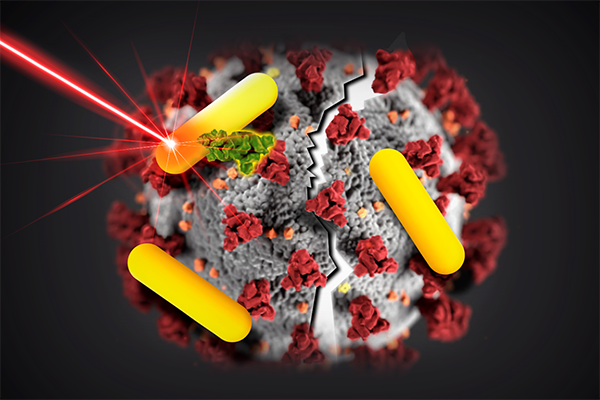
UPC researchers participate in the transformation of the european energy system to adapt to renewables
June 26, 2020
Prediction of occupation of public transport
June 30, 2020To carry out the study, the research group has been allocated 40 million hours of the supercomputer Joliot-Curie, Paris, which is equivalent to 4,500 years in hours of calculation

The research group Innovation in Materials and Molecular Engineering - Biomaterials for Regenerative Therapies (IMEM-BRT) of the UPC will investigate, in collaboration with B. Braun, the detection, blocking and elimination of the SARS-CoV-2 virus using functionalized nanoparticles and activation of nanosources of heat. To carry out the research, the supercomputer Joliot-Curie at the French Alternative Energies and Atomic Energy Commission (CEA) in Paris, France, will be used.
The research group Innovation in Materials and Molecular Engineering - Biomaterials for Regenerative Therapies (IMEM-BRT) of the Universitat Politècnica de Catalunya - BarcelonaTech (UPC) will carry out the project Estudio computacional para el desarrollo de plataformas de detección hiperespectrales del SARS-CoV-2 (Computational study to develop hyperspectral detection platforms for SARS-CoV-2). The project will be led by the researcher Joan Torras, from the IMEM group, with the collaboration of Oscar Bertran, from the same group. To carry out the study, the Partnership for Advanced Computing in Europe (PRACE), whose mission is to facilitate high-impact scientific discoveries in all disciplines for the benefit of society and to improve European competitiveness, has awarded to the UPC 40 million hours of the supercomputer Joliot-Curie that is installed in the CEA of Paris, which is equivalent to 4,500 years in hours of calculation with normal computers.
During the six months of calculation, simulations will be undertaken on molecular recognition mechanisms and applications will be studied to disactivate the virus. The effect of functionalized nanoparticles on the molecular structure of SARS-CoV-2 will be examined in depth. In particular, the influence of an increase in local temperature will be determined through the activation of nanosources of heat. The energy is transferred when the nanoparticles are illuminated with light of a certain wavelength and heated due to the effect of surface plasmon resonance, to deactivate the virus through irradiated heat.
The research is part of a COVID-19 project promoted by B. Braun, a multinational company in the hospital sector, in collaboration with the UPC, the Institute for Health Science Research Germans Trias i Pujol (IGTP) and the Josep Carreras Leukemia Research Institute (IJC). The study is focused on designing innovative strategies to detect, block or eliminate the virus, based on physical and chemical properties of functionalized metal nanoparticles.
Related Projects
- A team from the Bioinspired Oral Biomaterials and Interfaces (BOBI) research group at the Department of Materials Science and Engineering (CEM) of the Universitat Politècnica de Catalunya - BarcelonaTech (UPC) is taking part in the European project HYDROHEAL, which explores how to transform bone fracture treatment using smart and advanced biomaterials, aiming to reduce the risk of infection and implant rejection, as well as shortening fracture recovery times.
- Neurodegenerative diseases, such as Parkinson's disease, Alzheimer's, and age-related disorders, have been widely studied due to their significant impact on individuals and society. So far, these are incurable and debilitating diseases that lead to progressive degeneration and death of nerve cells, resulting in cognitive and mobility impairments. Tremors, mainly at rest, slowness of movement (bradykinesia), limb rigidity, and issues with gait and balance are typical motor disorders related to Parkinson’s disease. Additionally, due to progressive muscle atrophy, these issues can lead to falls, which in turn result in further complications and risks to quality of life.
- The Biomaterials, Biomechanics, and Tissue Engineering (BBT) Research Group at the Institute for Health Research and Innovation (IRIS) of the Universitat Politècnica de Catalunya – BarcelonaTech (UPC) is leading DYNAMIC, a project aimed at creating multifunctional, stimuli-responsive biomaterials that not only promote bone regeneration but also intelligently and effectively combat bacterial infections.
- 30/09/2024Project Headerrightno-repeat;left top;;auto20px A team from the Centre for Research in Biomedical Engineering (CREB) of the UPC and Sant Joan de Déu has created a new […]




